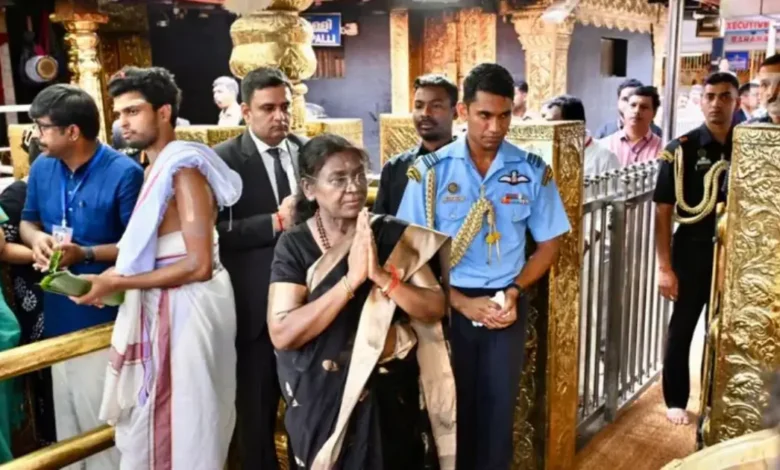Droupadi Murmu Sabarimala Visit: First Woman Head of State to Pray at Sacred Shrine

On Wednesday, President Droupadi made history by becoming India’s first female president to pray at the Sabarimala Temple in Kerala. Droupadi Murmu Sabarimala trip marks an important milestone for the Lord Ayyappa temple, which was at the forefront of the national debate regarding the entry rights of women.
The historic visit of President Droupadi to Sabarimala is only the second official presidential pilgrimage. Former President V.V. Giri was the first president to make a pilgrimage in the 1970s. This visit is a key part of President Murmu’s four-day tour in Kerala. It shows the respect that the Constitutional Head has for different religious traditions throughout India.
This visit by Droupadi Murmu Sabarimala is of great symbolic significance, as it comes years after the Supreme Court’s landmark ruling in 2018, which overturned the tradition that prohibited women who were menstruating from entering Lord Ayyappan’s temple, revered by his devotees to be an eternally celibate god.
Droupadi arrived around 11:00 AM at Pamba’s base camp, following the traditional customs of pilgrimage. The customary ritual was performed by washing her feet before praying at Lord Ganapathy’s shrine.
Bandi Sanjay Kumar, BJP MP, praised Droupadi’s Sabarimala trip in a post on social media, saying that she “broke neither rules nor hurt faith – but only honored them.” In a social media post, Bandi Sanjay Kumar praised the Droupadi Murmu Sabarimala visit. He said that the President “broke no rules and hurt no faith – she only honored it.”
Moreover, the MP noted that Droupadi’s visit to Sabarimala “reminds us that devotion does not shout; it stands proudly.” A powerful moment that shows the faith of millions of Ayyappa worshippers in India. The 18 steps of the temple have “seen debate and defiance, but devotion has always found its dignity,” he said.
Sabarimala’s President visit demonstrates how inclusive Indian democracy is, as the country’s highest office-holder can take part in different religious practices and still respect traditional customs. Droupadi Murmu Sabarimala is a great example of how religion transcends politics and brings people together from all backgrounds.
The historic Droupadi Murmu Sabarimala trip will be remembered for bridging the gap between constitutional authority and spiritual devotion. This pilgrimage reinforces that sacred sites can be used for worship by all while still maintaining their traditions.
The visit of Droupadi to Sabarimala was successful and without any controversy. This shows how religious practices are evolving in India today, a country where traditional values can live harmoniously with constitutional ones.
The President of India is the head of state of India, the largest democratic nation in the world. He represents the integrity and unity of his country. This office promotes secularism while recognizing the diversity of religious beliefs in India.





